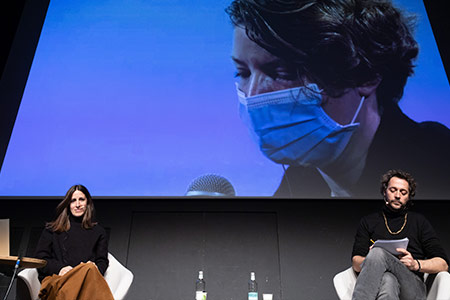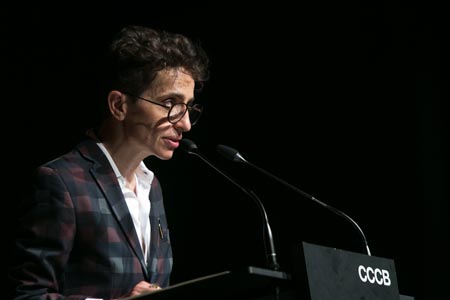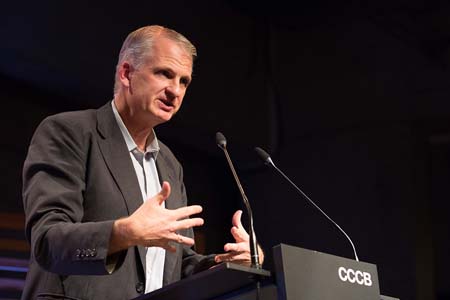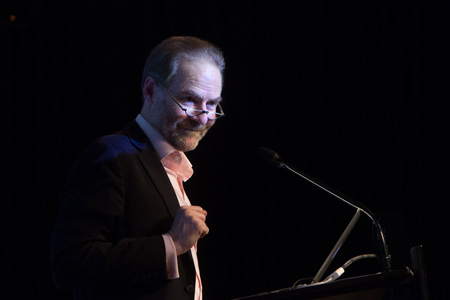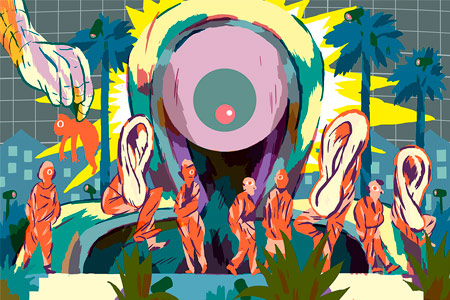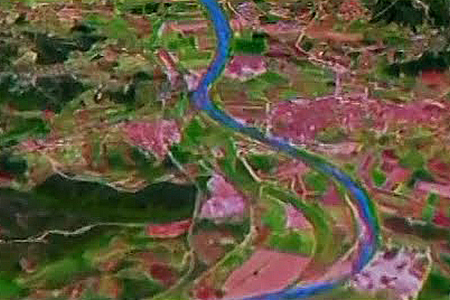The Shadow of "1984"
The COVID-19 crisis has raised the debate on collective security versus individual rights and freedoms. Are all means valid to deal with a pandemic? To what extent can a global fluid situation leads to technological control measures, disinformation campaigns, or more restrictive and authoritarian policies? George Orwell's 1984 shadow - an emblematic novel of the critique of totalitarianism - becomes very present when the democratic model falters and the algorithmic control of the population puts at risk the most basic freedoms.
Body and Pandemic: The Social Effects of Confinement
Wendy Delorme, Joana Moll and Núria Guiu
The queer activist and writer Wendy Delorme and the artist and researcher Joana Moll speak about the effects of the pandemic on bodily intimacy and social relations. The ballerina and choreographer Núria Guiu participates in the event with an abstract inspired by her piece Spiritual ...
Masha Gessen
Imagination and Democracy
In the framework of the Orwell Day, the journalist Masha Gessen defends imagination as a necessary tool for reviving the ideal of democracy and countering the assaults of totalitarianism.
Carolin Emcke: “We need a language of utopia to accompany our discontent”
Having been refracted through the media so many times, the word violence has accumulated an infinite number of meanings, in the form of images and sounds, and has ended up imploding. Voided inside, it serves only to make noise, propping up simplistic tales that seek sensationalism...
Timothy Snyder
A Defence of Freedom: On the Rise of Authoritarianism Today
The rise of the extreme right around the world has made manifest a growing mistrust in democracy as a political system in a shift which involves serious curtailment of freedoms and demonisation of minority groups. Timothy Snyder, one of the leading authorities on the history of Europe, warns ...
Timothy Garton Ash
Free speech under attack
Timothy Garton Ash, the internationally renowned intellectual and author of the book Free Speech: Ten Principles for a Connected World, speaks about the threats faced by free speech and debates about it, as well as the electoral rise of right-wing populism, laws against hate speech, and the conflicts arising between humour and religion.
Mark Bray, Jordi Borràs, Helena Castellà Duran and Carles Viñas: "Anti-Fascist"
Stopping fascism is a moral imperative, but how to go about it? Physically confront it in the streets or deny it the oxygen of publicity? “Cordon sanitaire” or legal strategy? Silence or denunciation? We will try to answer these questions with a panel of experts: Mark Bray, historian and author of Antifa.
Miquel Berga and Marc Martínez: "Reading Orwell nowadays"
On Freedom and the Right to Tell People What They Don’t Want to Hear
How relevant is George Orwell’s legacy? Many Orwellian concepts still resound forcefully around the world today, for example his defence of freedom of expression and opposition to censorship. On this fourth celebration of Orwell's Day at the CCCB, Miquel Berga, lecturer ...
Orwell in times of facial recognition
Ferran Esteve
George Orwell’s vision of dystopia, "1984", describes situations similar to those of current times and advances ethical dilemmas still difficult to tackle today.
The Flying Eye
Soy cámara online
The exponential growth of the drone sector and the ethical implications of its use have made it one of the most controversial technological innovations, both as a mass-produced toy and for its military uses. Drones are flying eyes, many already equipped with artificial intelligence, some designed ...
Saving Cassandra: the challenges of disinformation today
Berta Barbet
A reflection on the dangers and causes of disinformation within a context of lack of certainty and disaffection with the current system.
Global Screen. Surveillance Screen
The surveillance screen is everywhere and has even infiltrated our private lives. We exist, even before being born, on the ultrasound screen. Then, a whole battery of cameras follows us, throughout our daily lives: nothing gets by the surveillance screen.
The Other Net Behind the Great Wall (I)
Sandra Álvaro
With over 564 million users, China is home to the planet’s largest network of connected citizens. The Internet was introduced in China in 1994, along with the reform process that began after the Cultural Revolution. This first part of the article explores how China’s cultural heritage, ...
Mass Surveillance in Latin America
Alan Lazalde
In a global scenario where mass surveillance has already been exposed, especially thanks to cases such as Edward Snowden’s, we know privacy is a fundamental right we must protect. What is the situation like in Latin America in regards to mass surveillance?
